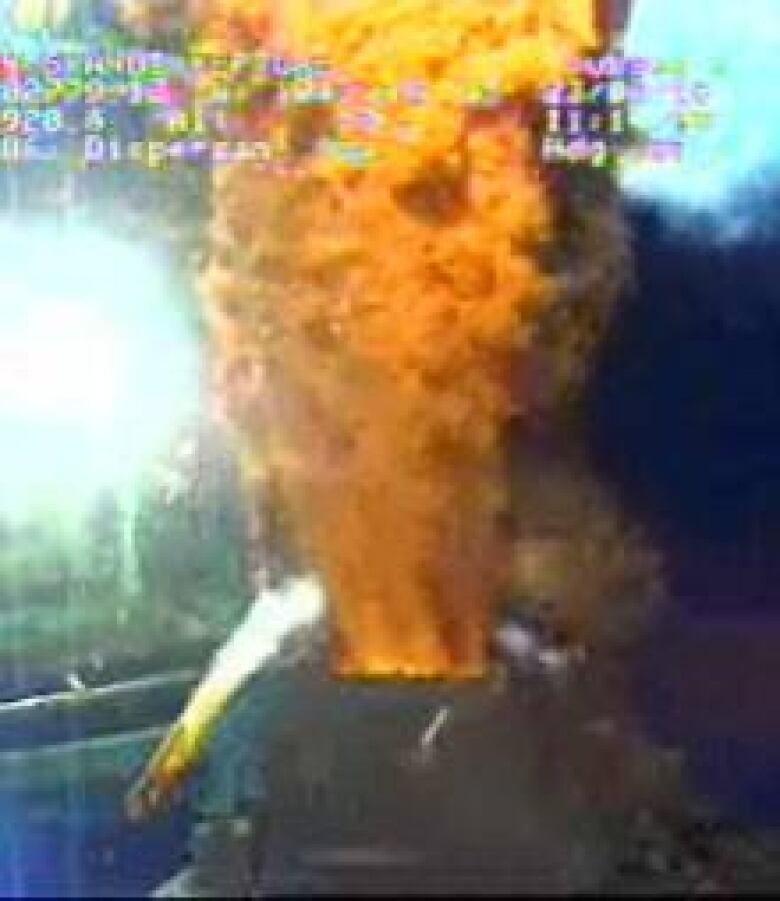BP forced to remove cap from gushing well

It was yet another setback in the nine-week effort to stop the gusher, and it came as thick pools of oil washed up on Pensacola Beach in Florida and the Obama administration tried to figure out how to resurrect a six-month moratorium on deepwater drilling.
When the robot bumped the system just before 10 a.m. Wednesday, gas rose through the vent that carries warm water down to prevent ice-like crystals from forming, U.S. Coast Guard Admiral Thad Allen said.
Crews were checking to see if crystals had formed before putting the cap back on. BP spokesman Bill Salvin could not say how long that might take.
"We're doing it as quickly as possible," he said.
Before the problem with the containment cap, it had collected about 2.6 million litres of oil in the previous 24 hours. Another 1.7 million litres was burned.
The current worst-case estimate of what's spewing into the Gulf is about 9.5 million litres a day.
A similar problem doomed the effort to put a bigger containment device over the blown-out well in May. BP had to abandon the four-storey box after the crystals — called hydrates — clogged it, threatening to make it float away.
The smaller cap, which had worked fine until now, had been in place since early June. To get it there, though, crews had to slice away a section of the leaking pipe, meaning the flow of oil could be stronger now than before.
Control switches over
BP managing director Bob Dudley has taken over the long-term response to the massive oil spill, the company announced Wednesday.
Effective immediately, Dudley will be known as president and CEO of BP's newly formed Gulf Coast Restoration Organization.

Dudley, who grew up in Mississippi, "has a deep appreciation and affinity for the Gulf Coast," Hayward said in a release.
"In the near term, my focus will be on listening to stakeholders, so we can address concerns and remove obstacles that get in the way of our effectiveness," Dudley said in the release.
Hayward's removal from the response operations post — and Dudley's appointment — come as no surprise.
Hayward had for many weeks been criticized for being aloof in comments he made about the size of the spill and its effects on the region. He was also accused by legislators of stonewalling investigations into what caused the BP-leased Deepwater Horizon rig to explode on April 20 and then sink, killing 11 people and causing the worst oil spill in U.S. history.
Last Friday, BP chairman Carl-Henric Svanberg foretold Hayward's removal, telling Britain's Sky News in an interview that Hayward would hand over control to Dudley and spend more time at home in the United Kingdom.
Appealing moratorium ruling
The Obama administration is plotting its next steps after U.S. District Judge Martin Feldman in New Orleans overturned a moratorium on new drilling, saying the government simply assumed that because one rig exploded, the others pose an imminent danger, too.

The White House promised an immediate appeal of his ruling. The Interior Department imposed the moratorium last month in the wake of the BP disaster, halting approval of any new permits for deepwater projects and suspending drilling on 33 exploratory wells.
Interior Secretary Ken Salazar said that within the next few days he would issue a new order imposing a moratorium that eliminates any doubt it is needed and appropriate.
"It's important that we don't move forward with new drilling until we know it can be done in a safe way," he told a Senate subcommittee Wednesday.
Several companies, including Shell and Marathon Oil, said they would await the outcome of any appeals before they start drilling again.
With files from The Associated Press